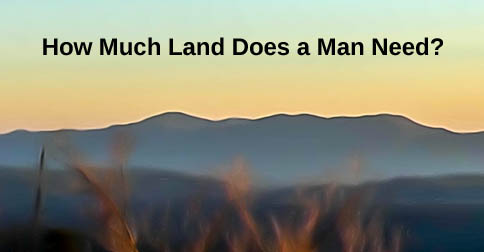The Ten Best Political Short Stories

Arizona landscape: image by Kevin Dooley (CC BY 2.0)
The Ten Best Political Short Stories list includes some great stories by Tolstoy, Kafka, Orwell and Calvino. An honourable mention goes to The Green Zone Rabbit by Hassan Blasim.
1. How Much Land Does a Man Need, Leo Tolstoy
Perhaps Tolstoy's most famous short story, highly praised by Joyce to his daughter as "the greatest story that the literature of the world knows," How Much Land does a Man Need? examines human greed in a near perfect parable.
In the end, undone by his greed for resources, Pakhom discovers just how much land a man needs, around seven foot, just enough to bury his listless body.
Life is for living not pursuing wealth.
2. The Metamorphosis, Franz Kafka
"When Gregor Samsa woke one morning from uneasy dreams, he found himself transformed into some kind of monstrous vermin." And what transformed Gregor into monstrous vermin? The workaholism he was driven to in order to meet the demands of his boss and the needs of his family. At first, while earning, Gregor is seen merely as an asset, but after his transformation he is merely a burden. At no point is he treated as a human being. Perhaps something about their society is making everyone monstrous.
3. The Dream of a Ridiculous Man, Fyodor Dostoevsky
The narrator has a revelatory dream about a possible utopia. Awakened, he is inspired and dedicates his life to the promise of a future world.
You may also want to read Dostoevsky's The Grand Inquisitor. Technically, it's a story lifted from his novel The Brothers Karamazov and not a short story but it's excellent. In the story, Jesus returns to earth but is instantly arrested by the Inquisition. In a dialogue between the inquisitor and Jesus the inquisitor does a good job at explaining how elites think and how they believe they should run society. It's often referenced by Noam Chomsky.
4. Smog, Italo Calvino
Italo Calvino's Smog, the story of a journalist working on an environmental newspaper in a heavily polluted city, was written in 1958 and was ahead of it's time in environmental awareness, in understanding what it means to control the parameters of public debate, and in understanding how corporate ownership influences journalists and shapes public perceptions.
5. The American Embassy, Chimamanda Ngozi Adichie
Chimamanda Ngozi Adichie is a master at showing how grand political events and personal lives intertwine. In this story a radical journalist must flee the country but leaves behind his wife and child. His child becomes a victim of the government and we are left to contemplate whether the journalists actions were brave or foolish.
6. Shooting an Elephant, George Orwell
Orwell's Shooting and Elephant, is it an essay or is it a short story? In this instance it suites me to claim it as a short story, and after all, we don't really know if it's true. The story describes a day in the life of a British colonial officer in Burma, which Orwell had indeed been. During the course of the day the officer must kill an elephant, which gave him insight into "the real motives for which despotic governments act."
7. Men in the Sun, Ghassan Kanafani
Ghassan Kanafani's 1962 classic explores what it means to be a refugee and to lose your belief in your rights as a human being.
8. The Assassination of Margaret Thatcher, Hilary Mantel
There's no twist at the end of Hilary Mantel's short story The Assassination of Margaret Thatcher.
9. A Marker on the Side of a Boat, Bao Ninh
Bao Ninh shot to fame with his novel on the Vietnam War, from the perspective of a Vietnamese soldier, The Sorrows of War. In this story he explores an intense encounter between a man and a woman during the carpet bombing of Hanoi. Bao Ninh also features quite heavily in Ken Burns' latest documentary on the Vietnam War.
10. Going to Meet the Man, James Baldwin
A short story by James Baldwin that contemplates the psychologically deep rooted racism in the South.
